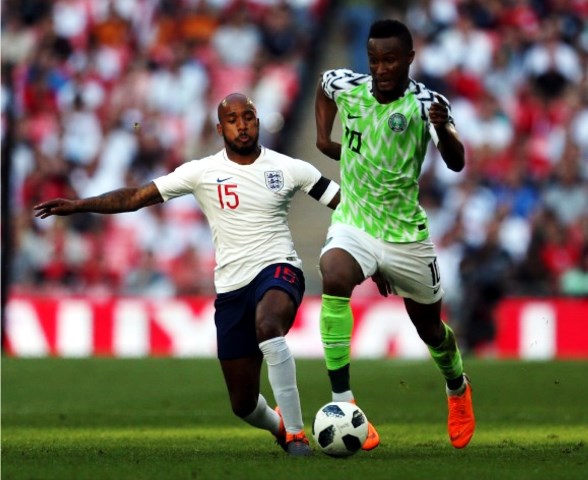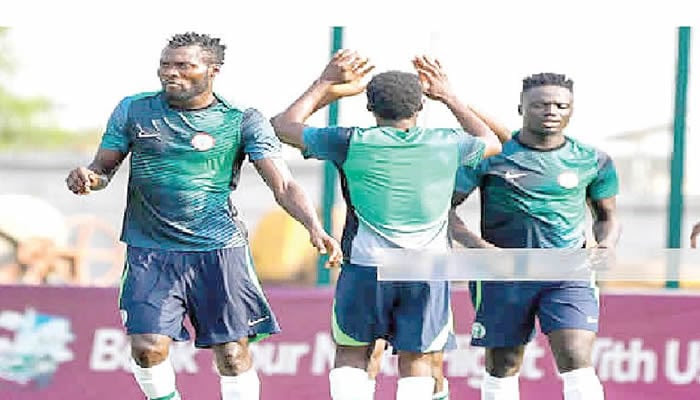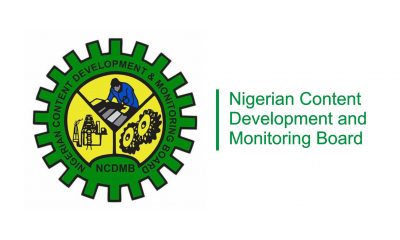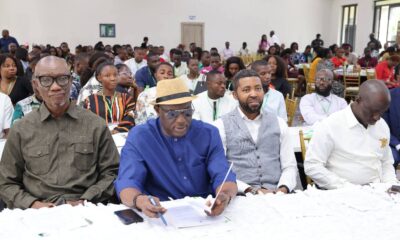Sports
Will African Team Reach Semi-Finals In Russia?

“When I first started to coach Ivory Coast, I said to Didier Drogba: ‘We have some fantastic players and we can go far in the World Cup.’ He said: ‘No we can’t’.”
Sven-Goran Eriksson is try
ing to shed some light on why Africa is still waiting for a first World Cup triumph more than 20 years after Brazil’s legend Pele predicted a winner from the continent by 2000. By the end of the 2010 World Cup, the Swede understood Drogba was not being negative – just realistic.
“The reason why they don’t do it? One word: organisation. It was total chaos when I joined,” Eriksson told Tidesports source.
At one stage, Pele’s prediction looked like it might come to pass. Nigeria came top of a group featuring Argentina and Diego Maradona at the 1994 edition, while the likes of George Weah and Jay-Jay Okocha were making their mark in Europe during the 1990s.
Yet, Africa, the second most-populated continent and a place where football is king, has still to produce a team to advance beyond the quarter-finals, let alone lift the gold trophy.
Egypt, Morocco, Nigeria, Senegal and Tunisia will compete in Russia from tomorrow but few believe they will get near the final, including former Cameroon defender Lauren.
“I could say we’ll have a team in the semi-finals but that’s not the reality,” said the two-time Africa Cup of Nations winner. “We’re still behind the top teams.”
Power shift in Africa?
None of the five heading to Russia is in the top 20 of Fifa’s world rankings and Peter Odemwingie, the former Nigeria forward, claims African football has gone backwards.
“There’s definitely been a decline,” said the ex-West Brom, Cardiff and Stoke striker, who played at the 2010 and 2014 World Cups.
“Nigeria had one of the best African squads at the 1994 World Cup. We were knocking on the door. We won the 1996 Olympics by beating Brazil and Argentina with all their stars.
“That period was like, ‘yes, it’s coming’.”
But Nigeria, who will be competing at her sixth finals in Russia, is still waiting. Along with the rest of Africa.
The three teams to make the quarter-finals, Cameroon (1990) , Senegal (2002) and Ghana (2010), have come from sub-Saharan Africa.
But in Russia, there will be more teams from the north than elsewhere on the continent, including a first appearance in 28 years for Egypt and a return after 20 years for Morocco.
A number of north African countries have players who learned their trade at academies in Europe, but it is Morocco who arrive at this World Cup with the most foreign-born players, seventeen of their 23-man squad were born outside the country.
Odemwingie believes those who play for the north African nations are “more clever” at reading the game and has also noticed a physical difference.
“It’s like Anthony Joshua fighting Floyd Mayweather,” he said on comparing a typical player from sub-Saharan Africa with one from the north. “The players in the north are a little bit leaner.
“They always start free-kicks faster, they have the mental game a bit more than the sub-Saharan teams.”
Bonus rows and boycotts
At the 2014 World Cup, Cameroon, Ghana and Nigeria all made headlines for the wrong reasons.
Ghana’s players boycotted training in protest at not receiving appearance fees owed to them in Brazil. It was only settled when their government sent more than $3m (£1.8m) in cash by plane. Meanwhile, Cameroon’s players arrived late in South America because of a dispute over bonus payments.
The Nigeria Football Federation (NFF) and the country’s players signed an agreement last November concerning the payment structure for the 2018 World Cup to avoid problems in Russia.
Former Tunisia World Cup defender Radhi Jaidi believes the financial disputes are down to “broken promises”.
“Players who come from Europe to play for their country, these players get paid on time by their clubs, they get bonuses, but it can be different when they play for their country,” Jaidi told our source.
“People promise things and when they don’t get them players get frustrated and clash.”
Yet off-field controversies are not something north African nations have had to worry about, mainly because things like bonuses are sorted well in advance of the tournament, according to BBC Africa’s Piers Edwards.
“They’re more organised and there’s greater accountability,” added Edwards.
Of course, World Cup rifts are not exclusive to Africa.
Eight years ago, France’s players refused to train following Nicolas Anelka’s expulsion from the squad for verbally insulting coach Raymond Domenech, while the Republic of Ireland were rocked by Roy Keane’s infamous row with manager Mick McCarthy in 2002.
Eriksson was in charge of Ivory Coast leading up to and during the 2010 World Cup.
He had plenty of talent at his disposal, including forwards Drogba and Salomon Kalou, who had both just won the Premier League with Chelsea,as well as midfielder Yaya Toure.
Yet the former England boss encountered “a total lack of organisation” as he prepared for group games in South Africa against Portugal, Brazil and North Korea.
The call for better organisation is familiar to those who have played and managed in the sub-Saharan region.
Patrick Mboma remembers Cameroon’s 2002 World Cup hopes virtually end before the team even arrived in Japan.
“The most important thing when you’ve qualified is that you have seven or eight months to prepare,” said the former Paris St-Germain striker.
“But you have some leaders who think you can prepare for a World Cup one month or two months before. It’s always too late.
“In 2002, I thought we could make it to the last four. Then it took 46 hours to reach Japan from Paris, so you can imagine how difficult it was.”
Tunisia’s preparations for the same tournament were disrupted by the sacking of Henri Michel shortly before the tournament.
“They spent a couple of months deciding on who was going to replace him. We didn’t win a game in Japan,” recalls Jaidi.
Lack of home-grown national managers
Of the 44 occasions African teams have competed at the World Cup come Russia 2018, 30 will have been managed by a non-African.
Cameroon, who as seven-time qualifiers are Africa’s most successful World Cup nation, have been led by four Frenchmen, two Germans and one Russian at the tournament.
In Russia, Egypt, Morocco and Nigeria will be coached by an Argentine, a Frenchman and a German respectively.
Scotland’s James McRea, a player with West Ham and Manchester United, set the tone for Africa’s World Cup outings when leading Egypt in 1934. Fans had to wait another 44 years for a first African World Cup coach, with Abdelmajid Chetali leading Tunisia to the continent’s first win at the finals, a 3-1 defeat of Mexico.
It was not until 2002 that a sub-Saharan nation first travelled to the finals with their own coach, Festus Onigbinde leading Nigeria, Jomo Sono at the helm for South Africa.
With no African having taken his nation into a World Cup quarter-final, these foreign appointments look set to continue.
“European coaches are different because they can offer a lot more than the matchday,” added Odemwingie.
“They can prepare better tactically rather than just relying on talent, which is what our coaches did.
“Now football has gone to sports science, nutrition, these are things some of our coaches had never even heard about.
“We’re more dependent on experienced coaches but we’ve a problem because we’re trying to grow our own managers and coaches.”
Eriksson believes teams would have better success if they followed the examples of Senegal, making their first appearance at a finals since 2002 after appointing Aliou Cisse in 2015, and Tunisia, who return to the tournament after a 12-year absence under Tunisia-born Nabil Maaloul.
“What some African nations do is have a local coach during qualification and if they are successful they then take in a big name from Europe or South America one or two months before the tournament,” he added.
“They should take in a coach and keep them for four years.
“It would be much better because, even if you have great players, to work with them for just one month at a World Cup is too little.”
Light at the end of the tunnel?
Morocco is in the running to host the World Cup in eight years’ time.
The North African nation is the only rival to a joint bid from Canada, Mexico and the United States for the expanded 48-team 2026 finals. A decision is due today.
Journalist and African football expert Mark Gleeson does not think it is beyond the realms of possibility that Africa will be celebrating a World Cup success in the future.
“You will always get these rare moments when everything clicks,” he said. “Look at Turkey in 2002. It would have been a preposterous idea before the tournament that they would reach the semi-finals.”
And despite a lack of organisation, infrastructure and finances, Jaidi is confident about the future.
“The problem is wider than just: ‘Oh yeah, definitely an African team will win the World Cup,'” said Jaidi. “It’s a complex situation. It’s not just one issue or one problem.
“When African teams play at the World Cup, there is always a thought at the back of the mind that we have no chance.
“We need to build a base that gives support to young African players who are now 10 or 15 years old to help them to the highest standards.”
Brighton and Cameroon defender Gaetan Bong said even the most basic facilities needed to improve in Africa.
“Sometimes you cannot even play because the pitch is not good enough,” he said. “We need to develop more because we have a lot of talented players in Africa, but we don’t have strong leagues.”
For all the problems he encountered with Ivory Coast, Eriksson hopes Africa will be celebrating a future World Cup triumph.
Asked how far an African side is from being world champions, the Swede said: “I don’t know when but I think Africa will win the World Cup sooner or later. Maybe later. It’s a pity because interest in football in Africa is huge.”
Johnston writes for BBC Sports
Neil Johnston
Sports
Former Champion Seeks Title Defence At Para Table Tennis Tourney
The 2006 Commonwealth Games silver medallist spoke to Tidesports source her desire to defend her para singles title in the women’s category and to also secure a qualification berth for both the regional West Africa para table tennis event in Abeokuta in September and the continental championship billed to hold in Cairo, Egypt in November.
The multiple Paralympian said, “My expectation is to come out great at this wonderful tournament and to qualify for the forthcoming tournament that is coming up in Nigeria and Egypt in September and November. Last tournament, I won the singles. I won three golds at the last ValueJet tournament. And I want to believe and hope that I will maintain my position by coming in first position.”
Ugwueke had featured in the para event at the 56th Molade Okoya-Thomas National Table Tennis Championships, held at the Teslim Balogun Stadium in January, where she suffered a stunning defeat to eventual finalist and tournament runner-up Taiye Oyinloye, who in turn was beaten 3-1 (11-3, 7-11, 11-6, 11-9) by Commonwealth Games medallist, Kate Oputa, to become the women’s class 1-5 champion.
The ValueJet Lagos Para table tennis Open, which is in its seventh edition, is an event sanctioned by the governing body ITTF Africa and put together by the Nigeria Table Tennis Federation in partnership with Lagos State Sports Commission.
The event will come to a close on July 11, with the competition serving as qualifiers for the country’s players for the regional tournament in Abeokuta.
A total of 98 athletes—57 men and 41 women—from Nigeria, Benin Republic, and Togo are competing in the singles events.
Notable performances have come from Alabi, Agunbiade, Ogunkunle, and Commonwealth Games medallists Kate Oputa and Faith Obazuaye, who have showcased their class against emerging talents across various classifications.
Their presence has intensified the battle for podium finishes, with top seeds asserting dominance in their respective singles events.
Sports
Nigerian Athletes Serving Doping Bans
The AIU announced in the June 2025 sanctions list on July 1 that 21-year-old quarter-miler Uko was found guilty of an anti-doping rule violation committed on June 5 2024. Her infraction falls under whereabouts failures, having missed three tests within a 12-month period.
The AIU confirmed that her period of ineligibility will run until 23 July 2026 and all results recorded from the date of the infraction have been officially disqualified.
Uko rose to fame after clinching three gold medals at the 2021 World U-20 Championships in Nairobi, winning the women’s 400 metres, 4x400m relay, and the mixed 4x400m relay.
Stephen Eloji (June 2028)
Sprinter and hurdler Stephen Eloji tested positive for dehydrochloromethyl-
The 25-year-old was active in the American collegiate circuit, recording strong performances in the 110m hurdles and relay events as recently as April 2024, including at the Pepsi Florida Relays and Music City Challenge.
Ada Princess Bright (September 2027)
Ada Princess Bright is serving a four-year ineligibility period after testing positive for Metenolone during the National Athletics Trials held on July 6 2023 in Benin City.
She had an active season prior to her suspension, competing in national meets in Lagos, Uyo, and Benin, and earning a relay gold at the African U20 Championships in Ndola, Zambia.
Grace Nwokocha (August 2025)
Nwokocha is serving a three-year ban after testing positive for SARMS substances including Ostarine and Ligandrol during the 2022 Commonwealth Games in Birmingham.
The fallout was significant, as Nigeria was stripped of its women’s 4x100m relay gold medal at the Games. Prior to her suspension, she had qualified for the Tokyo Olympics, posted a personal best of 11.00s in the 100m, and reached the semi-finals in the 100m and 200m at the 2022 World Athletics Championships. She is ineligible to compete until 2 August 2025.
Yinka Ajayi (January 2030)
Ajayi, a 400m specialist and one-time Olympic representative, is currently serving an extended eight-year ban for multiple anti-doping violations.
The first sanction, issued after she tested positive for Metenolone in an out-of-competition test in Iowa, USA, led to a four-year ban starting in December 2021. However, further findings of tampering led to an additional four-year penalty in 2024, extending her suspension until January 25 2030.
Glory Okon (January 2026)
Glory Okon is serving a four-year ban for testing positive for Metenolone following an out-of-competition test conducted on December 2 2021 in Nigeria.
She previously won gold in the 400 metres at the 2019 African U-20 Championships in Abidjan and featured prominently at the 2021 National Sports Festival in Benin City.
Blessing Okagbare (July 2031)
Once the face of Nigerian athletics, Okagbare is now serving a 10-year ban following multiple anti-doping rule violations. She tested positive for human growth hormone and EPO in an out-of-competition test in June 2021.
Her suspension came while competing at the Tokyo Olympics and was announced in February 2022. It was later extended by an additional year in June 2022 due to further breaches.
Divine Oduduru (February 2029)
Oduduru’s career was derailed by anti-doping violations linked to the 2020 Tokyo Olympics. On October 12 2023, a Disciplinary Tribunal of the AIU imposed a six-year ban on Oduduru after he was found guilty of possessing and attempting to use prohibited substances and methods. The case stemmed from the wider investigation into Eric Lira, the first individual convicted under the US Rodchenkov Anti-Doping Act, who supplied banned substances to athletes, including Okagbare, ahead of the Tokyo Games.
Oduduru’s ban is effective from February 9, 2023 and will run until February 8, 2029.
Henry Azike (Lifetime ban)
Azike is one of two Nigerian athletes currently serving a lifetime ban after testing positive for Metenolone, an anabolic steroid. His case was classified as a second ADRV, automatically triggering a lifetime suspension from the sport.
Azike last competed in 2011, including at the Doha Amir Cup and Nigerian Championships in Calabar.
Vivian Chukwuemeka (Lifetime ban)
Two-time Olympian and African shot put record holder Vivian Chukwuemeka is serving a lifetime ban for a second doping offence after testing positive for Stanozolol at the 2012 National Championships in Calabar.
The 2002 Commonwealth Games champion and multiple-time African gold medallist had previously served a two-year ban following a 2009 positive test. Her personal best of 18.43m remains the African record in women’s shot put.
Sports
Eagles B Players Admit Pressure For CHAN Qualification

Invited players into the Super Eagles B camp ahead of the rescheduled African Nations Championship tournament are feeling the pressure of selection, three days into their training camp at the Remo Stars Stadium in Ikenne, Ogun State.
The eighth CHAN tournament is taking place in Kenya, Tanzania and Uganda between August 2 to 20.
Ahead of the tournament, head coach Eric Chelle had invited an initial 35 players to camp and they began training on Monday with 21 players.
Five more players arrived on Tuesday to take the number to 26 while 28 players trained on Wednesday morning with the rest expected before the end of the week.
Captain of the team through the qualifiers, Junior Nduka, spoke about the intensity of the sessions and the jostle to make the final squad.
“Everybody is under pressure but definitely the coaches want the best among the 35 players,” Nduka said.
River United and former Flying Eagles forward, Aniekeme Okon, also admitted the pressure.
“It puts pressure on us, 35 players being invited, everybody is going to give out their best with an expectation of being selected. So we keep pushing.”
Ikorodu City defender, Leonard Ngenge also said, “Obviously, it puts everyone under pressure even myself. But I just need to do my best to be on the coaches’ radar.”
Nigeria, the 2018 runners-up, are in group D of the 19-team tournament, alongside Cup holders Senegal, Sudan and Congo.
The Super Eagles B will play their first two matches of the competition, against Senegal and Sudan, at the Amman Stadium on the island of Zanzibar, before taking on Congo at the Benjamin Mkapa Stadium in Dar es Salaam.
Nigeria has never won the tournament, having finished third at the 2014 edition in South Africa before losing the final against hosts Morocco four years later.
-
Politics21 hours ago
Bayelsa APC Hails Late Buhari As Change Agent In Nigerian Politics
-
News18 hours ago
South-South contributes N34trn to Nigeria’s economy in 2024 – Institute
-
Niger Delta20 hours ago
Police Rescue Kidnap Victim, Recover Pistol In A’Ibom
-

 Politics19 hours ago
Politics19 hours agoINEC Trains Political Parties Officials On ICNP Use Ahead By-Elections
-

 Business21 hours ago
Business21 hours agoReplace Nipa Palms With Mangroove In Ogoni, Group Urges FG, HYPREP
-

 Business18 hours ago
Business18 hours agoNCDMB, Dangote Refinery Unveil JTC On Deepening Local Content
-
Niger Delta20 hours ago
C’River Hands Over Rubber Plantation to Private Company
-

 Nation19 hours ago
Nation19 hours agoHYPREP Reaffirms Support For Ogoni Youths …Organises Workshop For Undergraduates

